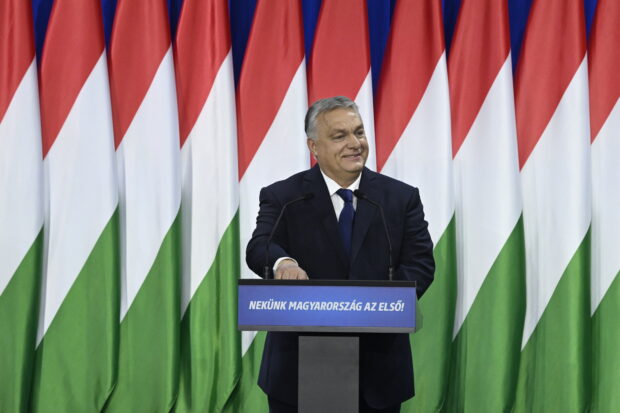
Hungary’s Prime Minister Viktor Orban delivers his annual “State of Hungary” speech in Budapest, Hungary, Saturday, Feb. 17, 2024. The message on lectern reads: “For us Hungary is the first!” (Szilard Koszticsak/MTI via AP)
BUDAPEST, Hungary — Hungarian Prime Minister Viktor Orbán sought to contain the political fallout of a presidential pardon scandal during an annual state of the nation address on Saturday, his first public appearance since Hungary’s president, his ally, resigned a week ago.
The nationalist Orbán is under intense pressure from multiple angles as his obstructionist conduct on the international stage has spurred growing frustration among his European Union and NATO allies.
Meanwhile, widespread public outrage has gripped Hungary over a pardon the president issued to a convict in a child sexual abuse case.
In his speech, which marked the 25th anniversary of his first address to the nation during his freshman term as prime minister in 1999, Orbán immediately addressed the resignation last week of President Katalin Novák. He said that 2024 “could not have begun any worse” and that her resignation was a “nightmare” for the country.
International news organizations, including The Associated Press, and Hungary’s independent media outlets were not permitted to attend the speech.
Orbán sought to mitigate outcry over the scandal that has shaken his nationalist Fidesz party in recent weeks, saying that Novák had made a responsible decision in stepping down.
Novák’s resignation was “correct, but a big loss for Hungary,” he said. “What happened is what needed to happen in this situation. Good people also make bad decisions.”
Fissures have opened within Fidesz after it was revealed that Novák, a close Orbán ally, issued a presidential pardon to a man imprisoned for covering up a string of child sexual abuse by the director of a state-run orphanage.
The revelations have led to three resignations within Orbán’s inner circle — including former Justice Minister Judit Varga, who countersigned the pardon — and led to public outrage that culminated in tens of thousands of protesters gathering in Budapest on Friday to demand change.
Outside Hungary, Orbán has faced isolation over his obstruction of key decisions by his international allies. The long-serving leader has laid roadblocks to EU funding for cash-strapped Ukraine, and Hungary remains the only holdout among NATO’s 31 members that has still not approved Sweden’s entry into the military alliance.
A bipartisan delegation of U.S. lawmakers is set to visit Budapest on Sunday for a “mission focused on strategic issues confronting NATO and Hungary,” underscoring the growing impatience among Hungary’s allies after 18 months of delays in ratifying Sweden’s bid to join the alliance.
But on Saturday, Orbán indicated that a vote on the matter could happen when Hungary’s legislature reconvenes on Feb. 26.
“It’s good news that our dispute with Sweden is nearing a conclusion,” he said. “We are moving towards ratifying Sweden’s accession to NATO at the beginning of the spring session of Parliament.”
As elections for the European Parliament approach this summer, Orbán has sought to unify the continent’s right-wing forces that reject liberal democracy, immigration and LGBTQ+ rights.
“Never before has there been such a gap between the policy of Brussels and the interests and will of the people of Europe. There needs to be a change in Brussels,” he said. “This change does not happen by itself, you have to force it. Europe must take back Brussels.”
Orbán, a proponent of what he calls “illiberal democracy,” has openly endorsed Donald Trump in his likely run for the White House in November, and has suggested that Russia’s war in Ukraine would not have started with Trump as president.
“We can’t get involved in another country’s elections, but we would really like President Donald Trump to return to the presidency and make peace here in the eastern half of Europe,” he said on Saturday.
As he referenced Hungary’s approaching rotating presidency of the European Council, set to begin in July, Orbán borrowed from one of Trump’s popular slogans to describe his plans for the role. “Make Europe great again!” he said. “MAGA there, MEGA here.”